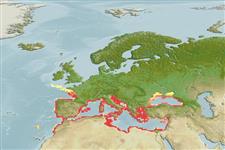Preferred temperature (Ref.
115969): 13.3 - 21, mean 18 (based on 276 cells).
Phylogenetic diversity index (Ref.
82804): PD
50 = 0.5000 [Uniqueness, from 0.5 = low to 2.0 = high].
Bayesian length-weight: a=0.00871 (0.00582 - 0.01304), b=3.06 (2.94 - 3.18), in cm Total Length, based on LWR estimates for this species & Genus-body shape (Ref.
93245).
Nível Trófico (Ref.
69278): 3.4 ±0.46 se; based on food items.
Resiliência (Ref.
120179): Médio, tempo mínimo de duplicação da população 1,4 - 4,4 anos (K=0.28).
Prior r = 0.99, 95% CL = 0.65 - 1.48, Based on 2 data-limited stock assessments.
Fishing Vulnerability (Ref.
59153): Moderate vulnerability (43 of 100).
Climate Vulnerability (Ref.
125649): High to very high vulnerability (70 of 100).
